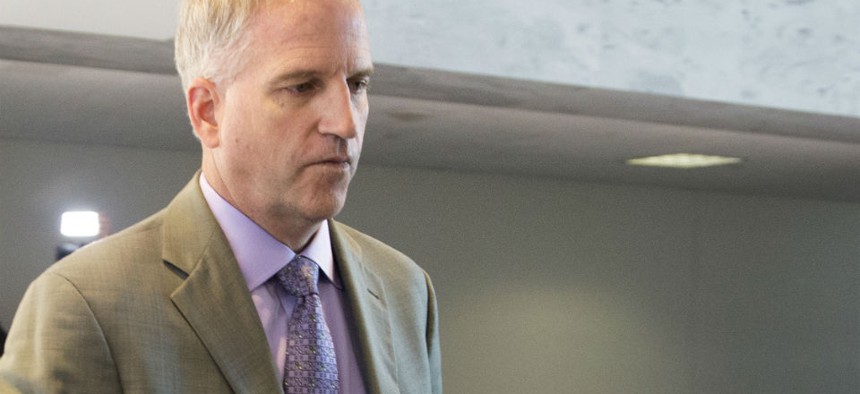
Robert Cardillo Manuel Balce Ceneta/AP file photo
Geospatial Agency Chief Takes Care Not to Oversell Intelligence on the Islamic State
Cardillo praises Defense agency’s new transparency, role in Ebola crisis.
The speed with which the self-proclaimed Islamic State gobbled up territory in Iraq and Syria has made mapping its reach difficult, “which means we don’t try to oversell our intelligence,” the director of the National Geospatial-Intelligence Agency said on Wednesday.
Robert Cardillo told reporters that “the nuances and gray areas” of satellite-based human geography have been front and center as his agency has prepared intelligence products for defense policymakers. “It’s difficult to assess whether ISIS controls a village, so, like climate change, we document what we can of the terrain, the fixed positions and headquarters, and make it clear to the reader that the band on this map is in flux.”
Cardillo took reporters’ questions before he spoke at a banquet in Arlington, Va., hosted by the Intelligence and National Security Alliance, a nonprofit that brings together current and retired intelligence officials, academics and private contractors.
Stressing the geospatial agency’s role in numerous current crises, Cardillo—who became its sixth director in October—cited the “democratization” of geospatial information as an impetus for NGA to partner with public and private organizations. “With our new focus on consequence and NGA’s great legacy of public service, I have been encouraging NGA to become even more transparent,” he said in his speech. “With more transparency, NGA is uniquely positioned to play a leading role to advance public confidence in the intelligence community.”
Expressing a desire for greater service to the State Department and the United Nations, Cardillo cited recent intelligence mapping of evidence of human rights violations by the violent Boko Haram movement in Nigeria, as well as aid to the struggling Afghan government in determining whether voter fraud discredited its recent elections.
But he singled out for special praise NGA’s work in West Africa to help alleviate last fall’s Ebola crisis, as an example of partnering with private and nonprofit sector organizations. “We are the first intelligence agency to create a [website] with access to our relevant unclassified content” of important sites in Liberia, Sierra Leone and Guinea. “It is open to everyone—no passwords, no closed groups,” he said.
Since the website’s October 23 launch, NGA has posted one-fourth of all its available content affecting Ebola, 99 percent of which is unclassified, he said. These include elevation data and suitable sites for treatment centers. “We have publicly posted 224 NGA products,” he noted. “Our transparency is striking a major chord with NGOs, international health organizations and other countries as we approach 1 million clicks on our website.” Cardillo expressed special pride in one on-the-ground analyst embedded with the 101st Airborne in Monrovia to help update Liberia’s maps.
“In addition, we are the first in the [intelligence] community to ‘crowd source’ applications development,” he said, describing a platform called GitHub that will allow the public to help improve our disaster response applications on 16 different topics.
The geospatial intel agency, he added, is the “most open and transparent intelligence agency involved in humanitarian relief, safety of navigation, public science and research. So we are natural integrators. Every modern local, regional and global challenge -- climate change, the future energy landscape and many more -- has geography at its heart.”







